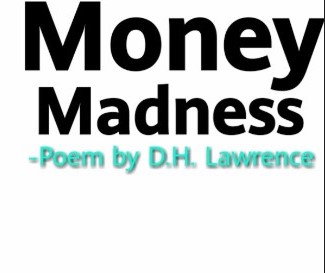Money Madness By D.H. Lawrence
D.H. Lawrence, whose full name is David Herbert Lawrence, was an English novelist, poet, and essayist born on September 11, 1885, in Eastwood, Nottinghamshire, England. He is best known for his novels, which often explored themes of love, human relationships, and the impact of industrialization on society. Some of his most famous works include “Sons and Lovers,” “Women in Love,” and “Lady Chatterley’s Lover.” Lawrence’s writing style is characterized by its vivid descriptions of nature and its exploration of the inner emotional lives of his characters. He was a prolific writer and a controversial figure in his time due to the explicit content in some of his works.
Now, let’s provide a summary of D.H. Lawrence’s short story, “Money Madness By D.H. Lawrence.”
Summary of “Money Madness” by D.H. Lawrence:
“Money Madness” is a short story by D.H. Lawrence that explores the destructive power of materialism and the obsession with wealth. The story follows the character of Freda, a young woman who marries a wealthy man named John, primarily for his money.
Freda’s obsession with wealth and material possessions gradually consumes her, and she becomes increasingly disconnected from her husband and her own humanity. She becomes fixated on her extravagant lifestyle, constantly seeking more money and possessions.
As the story unfolds, Freda’s marriage deteriorates, and she becomes isolated from her husband and friends. She becomes paranoid and suspicious of others, believing that everyone is trying to take her money. Her obsession with wealth reaches a breaking point, and she descends into madness.
The story serves as a cautionary tale about the corrosive effects of greed and the pursuit of material wealth at the expense of one’s relationships and mental well-being. It highlights the destructive power of money when it becomes an obsession, ultimately leading to the downfall of the protagonist, Freda.
“Money Madness” explores themes of materialism, the dehumanizing effects of wealth, and the consequences of prioritizing money over love and human connection. D.H. Lawrence uses the story to comment on the pitfalls of a society driven by consumerism and the relentless pursuit of financial success.
Question and Answer
1. How does the poet view the obsession with money in society?
Answer: The poet views the obsession with money in society as a form of collective madness. He believes that people are consumed by their desire for wealth, leading to a wide range of negative consequences.
2. What does the poet imply about the degree of madness for money among individuals?
Answer: The poet implies that the degree of madness for money varies from person to person. While some individuals may be fully consumed by their desire for wealth, others may be less affected. The extent of this madness depends on an individual’s values, priorities, and life circumstances.
3. How does parting with money make a person feel according to the poem?
Answer: Parting with money makes a person feel a sharp ache in their heart. The act of giving away money is portrayed as a painful experience, suggesting that people are reluctant to part with their wealth.
4. Why does the poet mention the feeling of handing out a ten-pound note?
Answer: The poet mentions the feeling of handing out a ten-pound note to emphasize the emotional impact of giving away a significant amount of money. It highlights the reluctance and discomfort that people may feel when parting with a substantial sum.
5. How does the poet describe the emotional impact of money on individuals?
Answer: The poet describes money as a source of fear and apprehension. He suggests that the more money a person possesses, the greater their anxiety becomes. Money is portrayed as a powerful force that can instill fear and insecurity in individuals.
6. Does the poet believe that people are afraid of money itself or of moneyed individuals?
Answer: The poet believes that people are not necessarily afraid of money itself but are awed or influenced by moneyed individuals. Moneyed individuals, those who possess significant wealth, may exert a certain level of power and influence over others, leading to a complex relationship between people and money.
7. What criteria do people often use to evaluate a person’s worth, according to the poem?
Answer: People often use a person’s wealth or financial status as a criteria to evaluate their worth in society. The more money an individual has, the more valuable or worthy they may be perceived.
8. How does the poet portray the treatment of money-mad individuals towards those without money?
Answer: The poet portrays money-mad individuals as dismissive and derogatory towards those without money. Money-mad individuals may mock and degrade those who are less financially fortunate, creating a divide in society.
9. What does the poet suggest that a person without money fears more – poverty or losing their dignity?
Answer: The poet suggests that a person without money fears losing their dignity more than poverty itself. The loss of dignity and self-respect is portrayed as a greater source of fear and concern for individuals who lack financial resources.
10. Why does the poet emphasize the importance of having some money?
Answer: The poet emphasizes the importance of having some money because he believes that money provides a sense of security and dignity. Without at least some financial resources, individuals may face humiliation, indignity, and a lack of basic necessities.
11. What does the poet mean by “bread,” “shelter,” and “fire” in the context of the poem?
Answer: In the context of the poem, “bread” refers to food, “shelter” refers to a place to live or a home, and “fire” refers to heating and cooking appliances. These are basic necessities for human survival and well-being.
12. Does the poet believe that these basic necessities should be provided for free? Why or why not?
Answer: The poet does not explicitly state whether these basic necessities should be provided for free. However, he highlights the importance of having money to access these necessities. Whether these necessities should be free or not is a matter of social and economic policy, and the poet does not offer a specific stance on this issue.
13. What does the poet mean by “regain our sanity” in line 25?
Answer: In line 25, “regain our sanity” means returning to a state of rational thinking and prioritizing values other than money. The poet suggests that society has become collectively obsessed with money and materialism, and regaining sanity implies refocusing on more meaningful aspects of life.
14. What choices does the poet believe society faces regarding money and values?
Answer: The poet believes that society faces a choice between two paths. One path involves blindly pursuing money and materialism, sacrificing noble values and descending into violence and chaos. The other path involves regaining sanity, reevaluating priorities, and moving away from the destructive obsession with wealth.
15. How does the poet view the impact of money on humanity as a whole?
Answer: The poet views the impact of money on humanity as detrimental. He sees it as a form of collective madness that leads to negative consequences, including the erosion of values, the loss of dignity, and the potential for violence and chaos. The poem highlights the poet’s critical perspective on the role of money in society.
Additional questions and Answer
1. What is the central theme of the poem “Money Madness” by D.H. Lawrence?
Answer: The central theme of the poem is the destructive obsession with money and materialism in society.
2. How does the poet describe the emotional impact of parting with money in the poem?
Answer: The poet describes parting with money as causing a sharp ache in the heart, suggesting that it is a painful experience.
3. What does the repetition of the word “dirt” in the poem symbolize?
Answer: The repetition of the word “dirt” symbolizes the degradation and humiliation faced by those without money.
4. How does the poet view the treatment of money-mad individuals toward those less fortunate?
Answer: The poet views money-mad individuals as dismissive and derogatory toward those without money, emphasizing the divide in society.
5. What does the poet suggest about the fear of losing dignity versus the fear of poverty?
Answer: The poet suggests that the fear of losing dignity is greater than the fear of poverty itself for individuals without money.
6. How does the poet view the role of money in evaluating a person’s worth in society?
Answer: The poet views money as a common criteria used to evaluate a person’s worth, with greater wealth equating to greater perceived worth.
7. What message does the poet convey through the repetition of the phrase “all and anybody”?
Answer: The poet conveys the idea that the consequences of money madness affect people universally, regardless of their specific circumstances.
8. What does the poet mean by the phrase “It’s one thing or the other”?
Answer: The poet suggests that society faces a choice between two paths—one characterized by an unhealthy obsession with money and the other focused on regaining sanity and meaningful values.
9. How does the poet view the impact of money on the mental state of individuals?
Answer: The poet views the impact of money as causing fear, anxiety, and a sense of insecurity in individuals.
10. What alternatives does the poet propose to the destructive obsession with money?
Answer: The poet proposes the alternative of regaining sanity and reevaluating priorities, moving away from the destructive obsession with money.
11. What role does the poet believe money plays in the lives of individuals and society as a whole?
Answer: The poet believes that money plays a dominant and destructive role, leading to madness, fear, and moral degradation in society.
12. How does the poet characterize the relationship between money and humanity in the poem?
Answer: The poet characterizes the relationship between money and humanity as one of madness, obsession, and negative consequences.
13. How does the poet convey his critical perspective on money and materialism in society?
Answer: The poet conveys his critical perspective through vivid descriptions of the emotional impact of money, the treatment of the poor, and the consequences of money madness.
14. What does the poet hope to achieve by emphasizing the need to “regain our sanity”?
Answer: The poet hopes to encourage society to reevaluate its priorities, move away from the destructive obsession with money, and return to a more rational and meaningful way of life.
15. How does the poet view the concept of dignity in relation to money?
Answer: The poet views dignity as a priceless possession that can be compromised by the pursuit of money and materialism.
16. What is the significance of the repetition of the phrase “money madness” in the poem’s title and text?
Answer: The repetition of “money madness” emphasizes the theme of the poem and underscores the destructive nature of the obsession with money.
17. How does the poet use imagery to convey the emotional impact of money in the poem?
Answer: The poet uses imagery such as “sharp ache in the heart” to vividly depict the emotional impact of money and parting with it.
18. What message does the poet convey about the consequences of prioritizing money over other values?
Answer: The poet conveys that prioritizing money over other values can lead to a loss of dignity, moral degradation, and a sense of fear and insecurity.
19. How does the poet characterize the behavior of those obsessed with money in the poem?
Answer: The poet characterizes those obsessed with money as dismissive, derogatory, and driven by a relentless pursuit of wealth.
20. What does the poet imply about the potential consequences of society’s obsession with money?
Answer: The poet implies that society’s obsession with money can lead to violence, chaos, and a regression to a more primitive state of existence.
21. What is the poet’s perspective on the relationship between money and human behavior?
Answer – The poet believes that an excessive focus on money can lead to a deterioration of human behavior and values. He sees the obsession with money as a form of madness that corrupts individuals and society as a whole.
22. How does the poet describe the impact of money on people’s lives?
Answer – The poet describes the impact of money as a destructive force that leads to selfishness, greed, and a loss of moral values. He suggests that the pursuit of wealth can turn people into heartless beings who prioritize money over human dignity and compassion.
23. What is the poet’s message or warning in the poem?
Answer – The poet’s message is a warning against the unchecked pursuit of wealth and materialism. He cautions that the relentless desire for money can lead to the degradation of human character and the erosion of essential values. He urges readers to reconsider their priorities and regain their sanity by valuing qualities like compassion, generosity, and human dignity.
24. How does the poem reflect the poet’s concern for the plight of the poor and disadvantaged?
Answer – The poem reflects the poet’s concern for the poor and disadvantaged by highlighting the indignity and suffering they endure due to their lack of money. The repeated mention of “dirt” and the poet’s call for basic necessities like bread, shelter, and fire to be freely available underscore his empathy for those who struggle in poverty. He emphasizes the need for society to address the suffering of the less fortunate and calls for a return to values that prioritize the well-being of all individuals, regardless of their economic status.
We sincerely appreciate your time and interest in our content Money Madness By D.H. Lawrence . Your support means the world to us, and we’re thrilled that you chose to visit our page.
At AskXYZ, we’re committed to delivering valuable and engaging content. We want to ensure that your experience with us is exceptional. That’s why we invite you to explore more of our posts/articles. We’re confident you’ll find something that piques your interest.
Your feedback is incredibly important to us. It helps us understand what you love and how we can improve. Please take a moment to share your thoughts or suggestions. We’re all ears!
Explore our other posts/articles and share your feedback with us .






